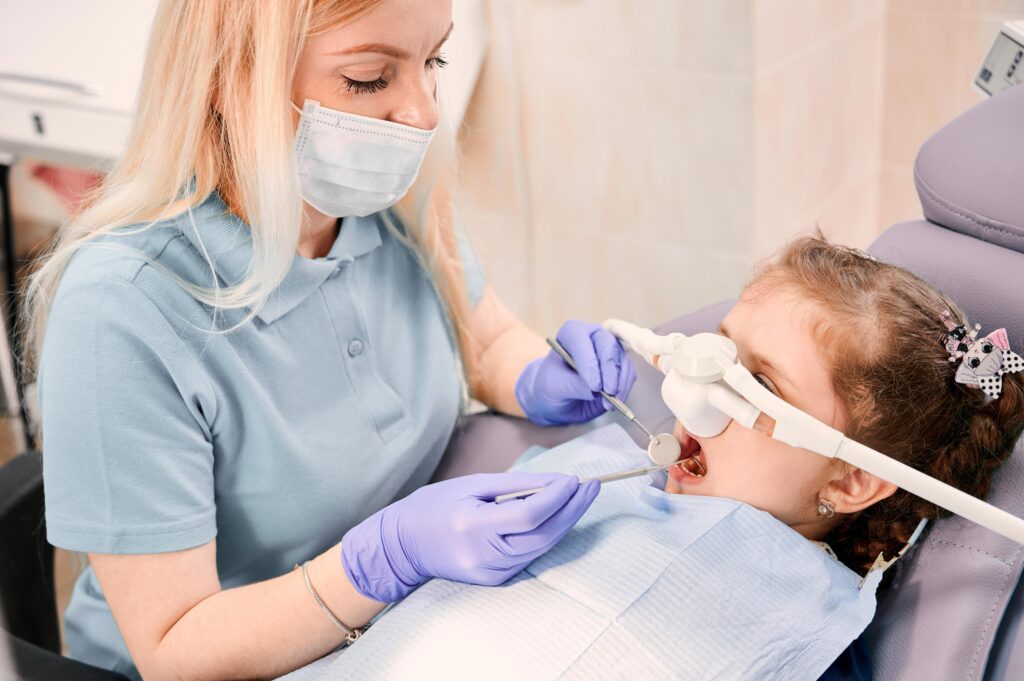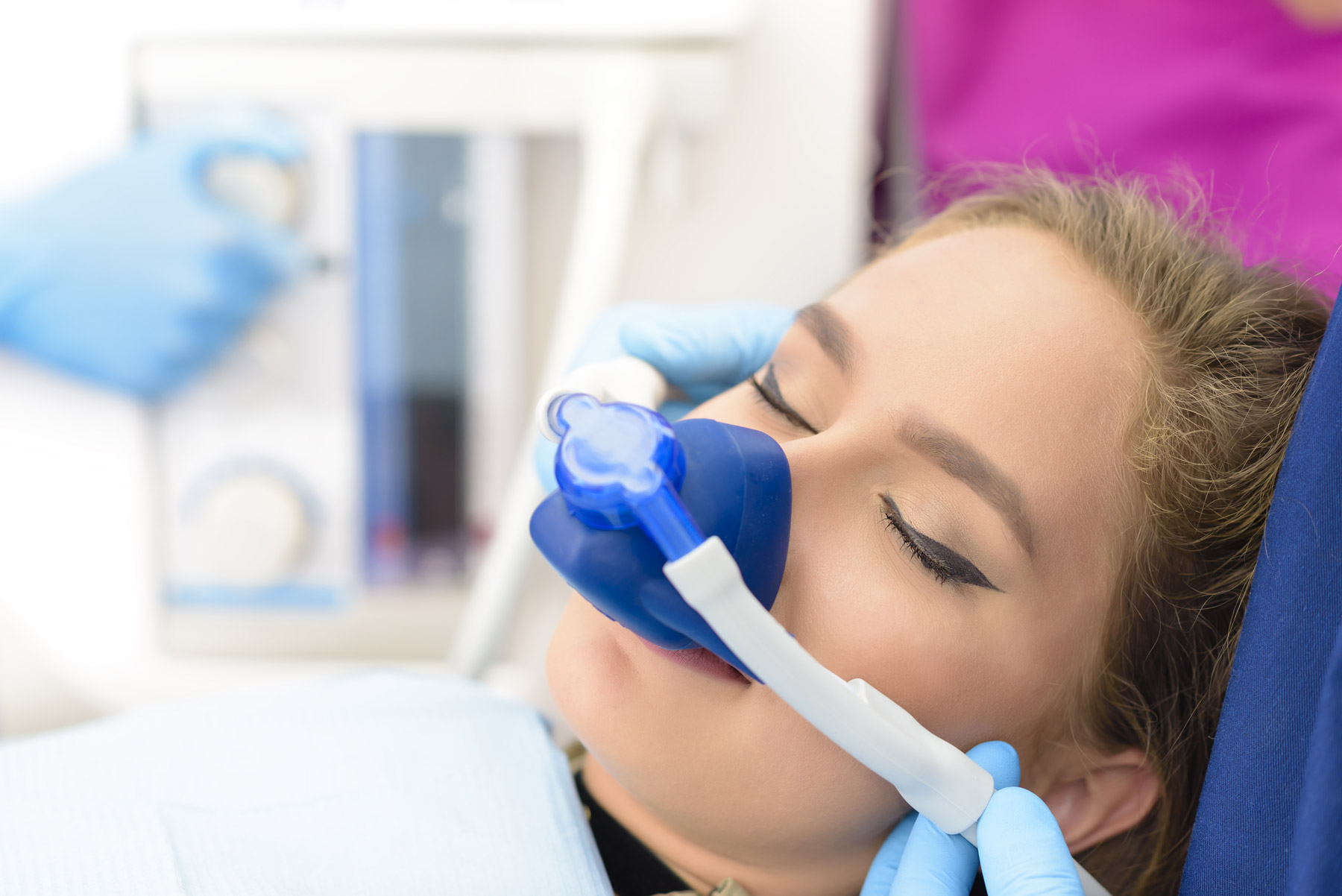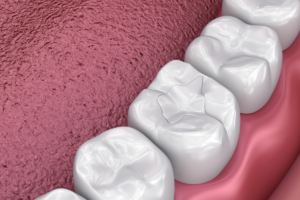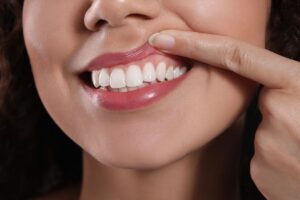YOU WILL DREAM LAID BACK IN THE BEST OF BOTH WORLDS SO LONG AS THE SLEEP DENTISTRY IS AWAKE!
Would you rather suffer from toothache than set foot in a dentist’s office? Sedation dentistry has come to America to put your anxiety to sleep if you avoid dental treatments because you’re scared of the process.
Is That Possible to Be at Ease in the Dentist’s Chair?
Like any other medical technique, sedation dentistry has been developed to relieve you of pain. Its main mission, however, is to support you mentally.
If you get anxious when you think of going to the dentist, avoid dental check-ups, or believe that the problems with your mouth are no big deal, you might be familiar with dentophobia. Dentophobia occurs when you are irrationally afraid of undergoing dental procedures.
Oral sedation is a modern technique that helps take your mind off the procedure when you go for a dental visit, though not directly dealing with your fears.
It can help you ignore any discomfort and calm down during your dental treatment, whether it is as complicated as a root canal or as routine as teeth cleanings. It also allows your dentist to complete the treatment faster and more efficiently.
Sedation dentistry is sometimes referred to as sleep dentistry since it effectively allows you to relax through the whole process. In this form of dentistry, medication is administered to ensure you are comfortable while your dental work is being performed.
It employs safe techniques to act on the central nervous system and reduce fear and anxiety signals.
There are diverse kinds of sedation dentistry, making it possible for many patients to enjoy the benefits of this solution. Regardless of the condition you are being treated for, sedation dentistry can help you through different approaches based on the severity of the dental problem, anxiety levels, and individual needs. These are your available options:
- Minimal sedation, which allows you to stay awake but relaxed during your treatment;
- Moderate sedation, also known as conscious sedation, which makes you remember as little from the procedure as possible;
- Deep sedation, which still allows you to be awake but holds you on the edge of consciousness; and
- General anesthesia in which you are fully unconscious.
Have You Ever Heard of Different Sedation Types in Dentistry?
You can benefit from this soothing technique and have a pleasant treatment experience regardless of your dental condition.
Based on the dental disorder you are suffering from, the sedation level shall differ, though. After discussing your oral history, personal issues, and fears, your dentist will recommend the best option.
Laughing gas is the most friendly sedation option.
In this approach, you will inhale Nitrous oxide through a mask over your nose during the whole procedure. Nitrous oxide, also known as laughing gas, is a popular mild sedative to help you relax, and your dentist focuses on the target condition.
It is an odorless, colorless gas mixed with oxygen, safe for all ages.
You will be aware when you receive the sedative, and once you inhale the gas, you may feel a little tired but will remain conscious, feeling no discomfort. The recovery is rapid, and you can get back to your everyday life right after the treatment. The effect quickly wears off with one or two breaths of ordinary air, and there is no risk of overdosing on the gas. There are no after-effects either, so this sedative is suitable for young children and teenagers.
There is more to dental inhalation sedation: This technique has immediate effects, a few side effects, and a flexible duration depending on the appointment length. Your dentist will have absolute control over the level of sedation which may change from moment to moment.

Oral pre sedative medication still keeps you awake.
Known as oral conscious sedation, this method takes advantage of medications before your treatment.
You will take a prescribed sedative before your treatment begins and will not remember the pain, noise, or smell associated with the dental procedure. This type of sedation can range from minimal to moderate, depending on the prescribed dose. For minimal sedation, you are usually supposed to take a pill about an hour before the procedure, which will make you drowsy but still awake. It would help if you took a larger dose to benefit from moderate sedation. You will probably fall asleep during the procedure but could easily wake up with a gentle shake.
Oral sedation allows you to follow simple orders, though you will not have any memory of the treatment. Since the effects of oral sedation can last for several hours, having a rest after your treatment is strongly suggested.
This low-impact sedative still helps patients achieve the desired effect and is one of the popularly used forms of sedation dentistry.
Intravenous IV sedation works faster.
To perform quicker sedation for your comfort, an oral surgeon or anesthesiologist will administer this form of sedative, which will help you sleep soundly through the procedure. Taking effect faster, this sedation allows the continual adjustment of its level.
The process starts with inserting a thin needle into your vein. You may be asleep or going in and out of sleep. Those with specific medical conditions may only be lightly sedated and not put to sleep.
The dentist maintains a constant drip of medication via the intravenous tube and will try to use as little sedative as possible. An antidote will reverse the effects of the medicines when the procedure is complete.
Hospital-based general anesthesia gives you a deeper sleep.
If you need an extensive face, jaw, or mouth reconstruction, your dentist may recommend certain medications that will make you almost unconscious during the procedure. This method can also be a good solution for patients with specific disabilities.
This type of sedation does not allow you to be easily awakened until the effects of the anesthesia wear off. Regardless of the type, the sedation should be accompanied by a numbing medication as a local anesthetic.
Which Patients Should Go For Sedation?
Sedation during oral treatments is best suited for people with anxiety, be it dental phobia, fear of needles, or a history of traumatic dental experience.
Fear of the dentist is more common than you might think. If you are guilty of putting off appointments out of fear, you might be a good candidate for sedation dentistry.
It can also help people with difficulty getting numb with local anesthesia, sensitive teeth or gums, or complex dental problems.
Others that can benefit from this effective solution are those who have:
- Specific disabilities or special needs;
- Low pain threshold;
- Sensitive teeth; and
- Bad gag reflex.
This technique has made dental treatment easier for parents when their children do not cooperate during the procedure or refuse to go to the dentist.
Are There Any Risks With Sedation Dentistry?
Oral sedation in dentistry is generally a safe and relaxing alternative that rarely interferes with other medications. However, to prevent any possible complications, it would be best to talk about your situation with a qualified dentist, sharing your medical history and overall health. You should inform the dentist of any conditions such as allergic reactions to drugs, heart and respiratory disorders, or diabetes.
Specific conditions such as sleep complications or obesity can make it difficult to keep sedation under control. People suffering from these conditions need to consult their doctor before the sedation since they are more likely to develop complications from the anesthesia.
The risks and after-effects of sedation differ from person to person based on many factors. The most common side effects are hiccups and dry mouth, though you will probably not remember them after the effects wear off.
Allergic, distinctive, or paradoxical reactions to the sedative can occasionally occur. You may also experience drowsiness, an altered perception of time, lightheadedness, clumsiness, unsteadiness, nausea, hallucinations, or dreams. Less common side effects include blurred vision, memory loss, or insomnia for several days.

What Are The Benefits of Sedation?
Whether you are worried about visiting a dentist or prefer a more pleasant treatment, you can feel at ease thanks to sedation dentistry’s solutions. Even if you do not suffer from anxiety while at the dentist, sedation dentistry still has something to offer:
- Sedation can be helpful if you struggle to sit for long periods by giving you physical comfort and mental ease.
- The pain caused by the procedure will fully diminish thanks to the sedatives and anesthetics.
- The anterograde amnesia is exceptionally desirable for your negative memories. Most dental sedation medications lead to temporary amnesia.
- With Sedation Dentistry, there is a chance to combat dentophobia, especially in children who have not yet had any unpleasant dental experiences. Since they won’t feel any pain during the procedures, regular visits to the dentists will be a happy, friendly occasion rather than a horrific memory.
- Sedation dentistry can save you time by giving your dentist the opportunity to perform multiple procedures at once. Since sedation keeps you still for an extended period, your sedative dentist may be able to complete all the necessary treatments in one or two visits.
- It is also beneficial for patients with sensitive gag reflex who find it challenging to keep still while at the dentist. A gag reflex helps the throat expel any intrusive and foreign object, but it can interfere with your dental work. Sedation paralyzes the gag reflex, which will help you to feel more comfortable, and your dentist to work more efficiently.
Why Should You Call Aria Dental Before You Call A Psychologist?
With sedation dentistry at your disposal, you can now enjoy relaxing visits to a dentist. An increasing number of dentists can give you minimal or moderate sedation nowadays. However, only the dentists who have completed the commission on dental accreditation program in deep sedation and general anesthesia can administer the more complex sedatives.
You are recommended to seek a dentist who holds permits to perform sedation. It is equally as essential to ensure that your dentist is trained and competent to administer the type of sedation you will be receiving. You should also make sure the following precautions are taken:
- Before the treatment, your dentist should go over your medical history and decide whether you are an appropriate candidate for sedation, and ask about any medications you are currently taking.
- The dentist should inform you of the dose of the sedative that is appropriate for you concerning your situation. It is supposed to be within the FDA’s recommended dosage.
- It is crucial to specify how much training the dentist has had.
- You should receive a form detailing the risks of the sedation and go over it carefully with your dentist.
- The dentist should monitor your vital signs during the procedure and be prepared to reverse the effects of sedation at any time.
If you are considering sedation as a solution to your fear of undergoing dental treatment, you deserve to have a pleasant experience in good, compassionate hands. Our professional staff at Aria Dental is here to deliver exceptional dental care in a restful environment to help you drift away from anxiety. They will also meet your requirements of learning more about your oral health.
We recommend you refer to a psychologist simultaneously following your treatment to address your dental fear. However, since it could be time consuming to discover the underlying reason and the best remedy for dentophobia, you would better start your dental practice before it is too late.
Trusting our accredited dentists can be rewarding. Here, all you have to do is to sit back and relax!



















